In the quiet town of Buda, Texas, Roxli Doss was a vibrant, happy 11-year-old who loved nothing more than riding her horse and spending time with her friends. She was an active, carefree girl, her laughter often ringing through the family home. Life was simple, predictable, and full of promise.
Then, everything changed.
It started as what seemed to be mild headaches—just a normal part of childhood, or so her parents, Gena and Scott Doss, thought. But these headaches soon became more intense. Roxli began experiencing nausea, dizziness, and, at times, difficulty focusing. It wasn’t long before her parents noticed a difference in her behavior—she was no longer the energetic girl they knew. She was tired, withdrawn, and struggling in ways they couldn’t explain.
Worried, the Doss family took her to the local doctor, thinking she might have migraines or perhaps even an eye problem. But after a few preliminary tests, the doctor’s face turned serious. He referred them to a specialist in Austin, Texas, urging them to act fast.
What they would soon discover was every parent’s nightmare.
The specialists conducted a series of MRI scans and tests. Roxli’s parents waited anxiously, hoping for a simple answer—a vitamin deficiency, maybe dehydration, anything but something serious.
Then, the news came.
Roxli was diagnosed with Diffuse Intrinsic Pontine Glioma (DIPG), one of the deadliest and most aggressive brain tumors known to medicine. It develops in the pons, the part of the brainstem that controls essential bodily functions like breathing, heart rate, and motor skills.
Dr. Virginia Harrod, a pediatric neurologist at Dell Children’s Medical Center, explained the grim reality. “DIPG is a rare, devastating disease,” she said. “Over time, it affects a child’s ability to swallow, speak, and even breathe. There is no cure, and survival rates are extremely low.”
For the Doss family, it was as if the world had collapsed around them. How could this be happening? Just weeks ago, Roxli was running through fields with her horse, laughing without a care. Now, she was being told she had a terminal illness.
DIPG is a cruel disease, striking only about 200 to 300 children per year in the United States. It is notoriously difficult to treat because of its location—deep in the brainstem, where surgery is impossible. There is no known cure. Most children diagnosed with DIPG survive only 9 to 12 months after symptoms begin.
With their hearts shattered, Gena and Scott knew they had to do everything in their power to fight for their daughter.
The Doss family refused to accept this fate without a fight. They sought second, third, and even fourth opinions. They traveled to some of the most renowned medical institutions in the country:
Texas Children’s Hospital in Austin.
Dana-Farber Cancer Institute in Boston.
Johns Hopkins Children’s Center in Baltimore.
MD Anderson Cancer Center in Houston.
Each doctor gave them the same heartbreaking confirmation—Roxli had DIPG, and the prognosis was grim. There were no known survivors of this disease.
Still, Gena and Scott were determined. If a cure didn’t exist, they would pray for a miracle.
Doctors recommended radiation therapy, the only known treatment that could temporarily shrink the tumor and prolong life by a few months. Roxli underwent six weeks of intensive radiation at Dell Children’s Medical Center.
Radiation can help shrink 70% of DIPG tumors, but it’s only a temporary solution. The tumor almost always comes back stronger after a few months. The family clung to hope, but the statistics were against them.
The side effects of radiation were harsh. Nausea, extreme fatigue, and difficulty swallowing became part of Roxli’s daily life. But despite the pain, she never stopped smiling. She still joked with the nurses, still tried to ride her horse on days when she had enough energy.
Her parents, meanwhile, were barely holding on. They turned to their faith and community for support. Friends, family, and strangers rallied behind them. Prayer groups gathered across the town, asking for a miracle.
After completing six weeks of radiation, Roxli underwent another MRI scan. Doctors expected to see some shrinkage in the tumor, but they weren’t prepared for what they found.
There was nothing.
The tumor was completely gone.
Dr. Harrod, who had seen countless DIPG cases before, was speechless. “When I first saw Roxli’s MRI scan, it was actually unbelievable,” she said. “The tumor was just… gone. Completely gone.”
The entire medical team was in shock. DIPG tumors don’t just disappear. There has never been a recorded case of complete spontaneous remission in DIPG history.
Roxli’s parents could hardly believe it. “We were just stunned,” Gena said. “We had prepared ourselves for the worst. We had prayed for a miracle, but this was beyond anything we had imagined.”
Scott, holding back tears, added, “We didn’t know how long she would be healthy… and look at her, she’s just doing awesome.”
The sudden disappearance of Roxli’s tumor defied all scientific explanation. Spontaneous remission is extremely rare in cancers, but almost unheard of in DIPG.
Dr. Momna Hejmadi, a cancer researcher at the University of Bath, offered one possible explanation. “Sometimes, the body triggers an immune response that attacks cancer cells,” she explained. “In extremely rare cases, this can lead to spontaneous remission.”
Another theory suggests that radiation therapy somehow triggered the immune system to destroy the tumor. But even this doesn’t fully explain what happened—radiation typically shrinks DIPG tumors, not eliminates them completely.
Could it have been a divine intervention? A true miracle? The Doss family had no doubts.
“Every day, we say it: God healed Roxli,” Gena said. “There’s no other way to explain it.”
Doctors, though amazed, remain cautious. While Roxli’s scans show no signs of cancer, DIPG is known to return aggressively. To ensure her health, doctors have placed her on intensive follow-ups and new experimental treatments, including immunotherapy to prevent any recurrence.
While Roxli’s miraculous recovery stunned doctors and thrilled her family, the battle was far from over. DIPG is an unpredictable disease, and its sudden disappearance raised more questions than answers. No one knew if the tumor would return, and if it did, how quickly it might spread.
To ensure her continued health, doctors recommended regular MRI scans and advanced monitoring. They wanted to track her condition closely, fearing a hidden resurgence of the cancer. But for now, Roxli was healthy, happy, and completely free of symptoms.
Yet, even as the Doss family celebrated, they couldn’t ignore the shadow of uncertainty that loomed over them.
Could the Cancer Come Back?
DIPG is known for being one of the most aggressive and resistant forms of cancer. Even though Roxli’s tumor had vanished, there was no medical precedent for such a case. Doctors simply had no idea what would happen next.
One of the biggest concerns was whether this was a true remission or simply a temporary disappearance. Could the tumor have shrunk beyond visibility, only to reappear later with devastating speed?
Dr. Virginia Harrod remained cautious, stating:
“We are absolutely thrilled that the tumor is no longer visible. But we still have to be very careful. We’ll continue monitoring her closely because DIPG is highly unpredictable.”
This meant constant check-ups, MRI scans, and consultations with leading cancer experts. The Doss family braced themselves for an ongoing journey, balancing hope and fear with each new test result.
Since radiation alone should not have eliminated the tumor, doctors suggested an experimental approach to prevent any possible recurrence: immunotherapy.
Immunotherapy is a revolutionary form of cancer treatment that teaches the body’s immune system to recognize and destroy cancer cells. In some cases, it has been shown to stop cancers from returning.
However, immunotherapy is still highly experimental for DIPG patients. It had never been used in a case like Roxli’s before.
Her doctors believed that if anything could prevent a relapse, this might be it. They began planning a customized immunotherapy treatment that would keep her immune system on high alert against any hidden cancer cells.
“We’re entering new territory,” said Dr. Harrod. “There is no roadmap for a case like Roxli’s. We are learning as we go.”
For the Doss family, this was a risk worth taking. They had already witnessed a miracle, and they were willing to do everything possible to keep Roxli healthy and cancer-free.
With her tumor gone and her treatments underway, Roxli returned to something resembling a normal childhood.
She started going back to school, reuniting with friends who had feared the worst just months earlier. Her teachers, classmates, and the entire town of Buda, Texas, treated her as a living miracle. Some people even traveled from nearby towns just to see the girl who had defied all odds.
But for Roxli’s family, there was still a lingering fear—what if the tumor came back?
While Roxli resumed horseback riding, school activities, and even playing outside like any other kid, her parents remained on edge. Every time she had a headache or felt tired, they wondered: Is it happening again?
To maintain her health and monitor any changes, Roxli’s doctors scheduled frequent MRI scans. The goal was simple—catch anything suspicious before it had a chance to grow.
“We take things one scan at a time,” Gena said. “That’s our new normal.”
Her immunotherapy sessions were also a key part of this new phase. Since no DIPG patient had ever experienced a disappearance like hers, Roxli was a pioneer in a way—doctors wanted to see if immunotherapy could help keep the cancer away for good.
The process was exhausting, requiring frequent hospital visits, blood tests, and monitoring. But Roxli remained resilient. She had beaten the impossible before, and she was determined to live her life fully.
Even as the Doss family celebrated, scientists and doctors around the world were trying to figure out how a DIPG tumor could vanish completely.
Spontaneous remission is extremely rare, especially in aggressive brain cancers like DIPG. There were a few theories:
An Overactive Immune Response:
Some doctors believe her immune system somehow recognized the tumor as a foreign threat and attacked it.
Similar cases have been reported in some types of cancer, but never before in DIPG.
Radiation Triggering a Deeper Healing Response:
While radiation usually shrinks DIPG tumors, it never eliminates them completely.
Some researchers theorized that the radiation triggered an extreme immune reaction that helped destroy the tumor.
A One-in-a-Billion Medical Anomaly:
The medical community had no definitive explanation.
Some doctors admitted that this was simply unexplainable—a one-in-a-billion event.
While scientists searched for answers, Roxli just wanted to be a normal kid.
Throughout Roxli’s journey, faith played a central role. The Doss family prayed every day, believing that God had healed their daughter.
The entire town of Buda, Texas, had come together to support them—whether it was through prayer, fundraisers, or simple gestures of kindness.
Even strangers who had never met Roxli before sent messages of encouragement and support.
“Every day, we still say it: God healed Roxli,” Gena said. “There’s no other way to explain it.”
But while the family was deeply grateful, they still had to deal with the financial burden of Roxli’s treatments.
Cancer treatment is incredibly expensive, and even though Roxli was now cancer-free, the medical bills had piled up.
The Doss family set up a GoFundMe page, hoping to raise $50,000 to cover Roxli’s medical expenses.
So far, they had raised around $25,000, but they still needed more support.
“We are using this page to keep family and friends updated in one place,” the Doss family wrote. “We appreciate your support and words of hope and encouragement.”
The outpouring of love was overwhelming. People donated whatever they could—some gave small amounts, while others donated thousands.
For the Doss family, every dollar mattered. Every bit of help meant they could focus on Roxli’s health without financial stress.
As word of Roxli’s story spread, she became an inspiration to thousands of families battling childhood cancer.
Parents of children with DIPG reached out to the Doss family, hoping to learn from their experience. Some clung to hope, wondering if their child might be the next Roxli.
The case even caught the attention of cancer researchers around the world. Many hoped to study Roxli’s medical records, looking for clues that could lead to future treatments.
While the Doss family had no concrete answers, they were grateful for every single day with their daughter.
A year after her miraculous remission, Roxli is thriving.
She has returned to horseback riding, school, and hanging out with her friends—activities that once seemed impossible when she was first diagnosed.
“She’s just doing awesome,” Scott Doss said. “We didn’t know how long she would be healthy, but look at her now.”
The regular MRI scans continue. Each scan is a moment of tension for the family. So far, there has been no sign of the cancer returning.
Doctors remain cautious but hopeful. If Roxli stays cancer-free for several years, her case could lead to groundbreaking research into how some cancers mysteriously disappear.
For now, the Doss family takes it one day at a time, grateful for every moment they have with their daughter.
“No matter what happens, we are blessed,” Gena said. “We got our miracle.”


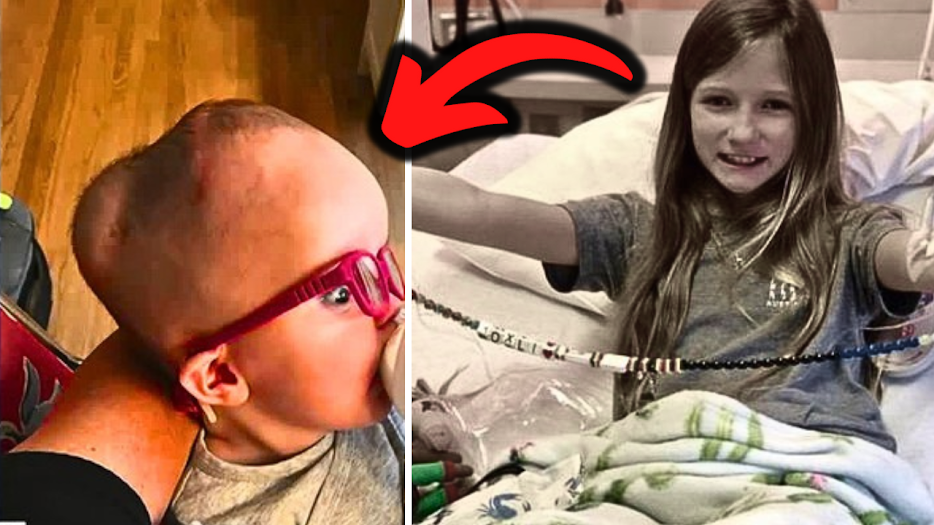
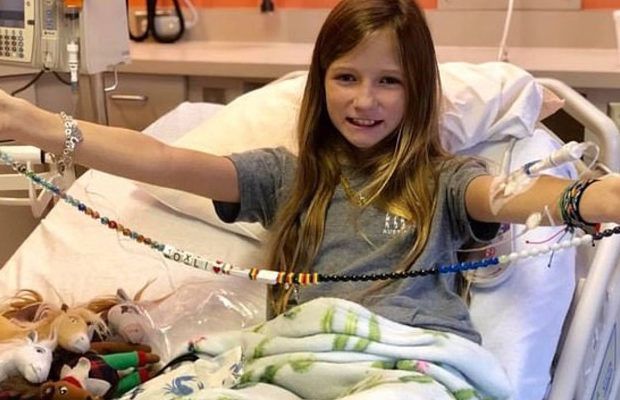
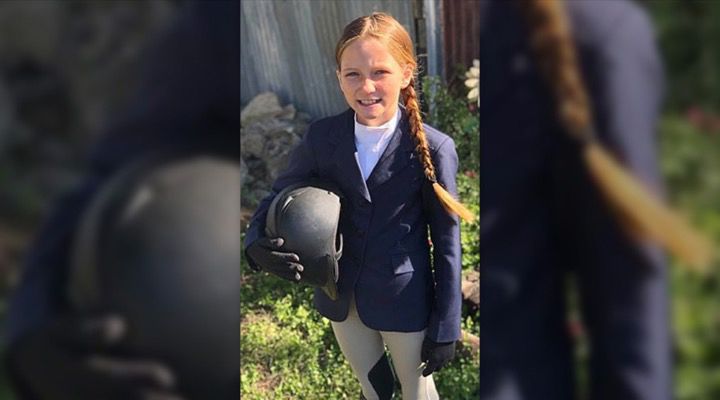
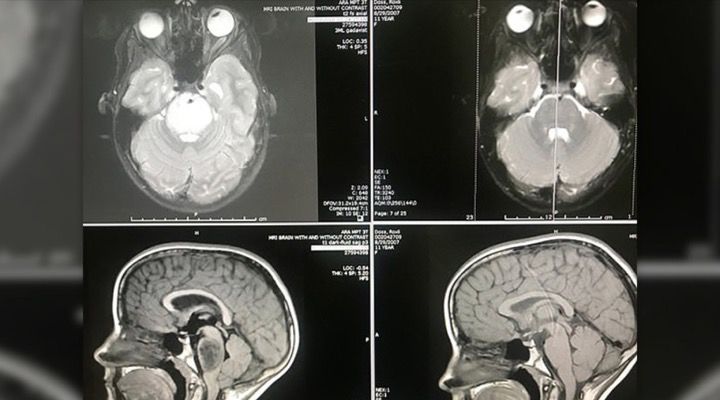
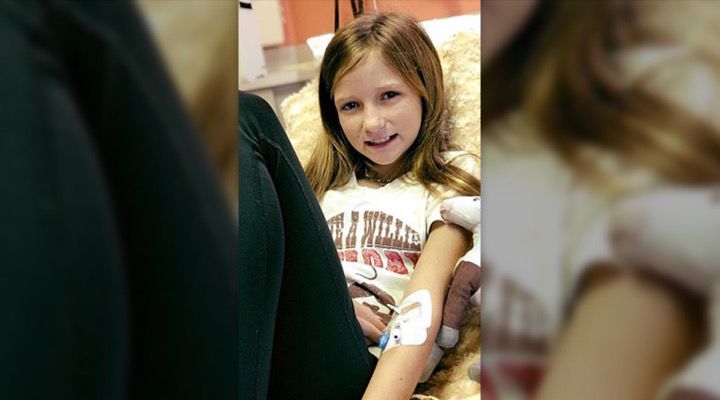


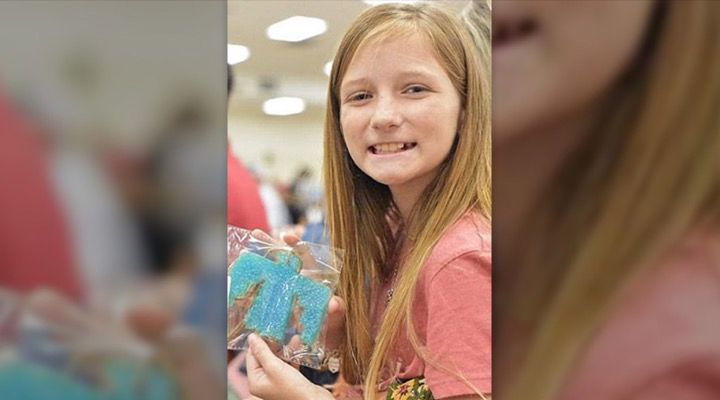
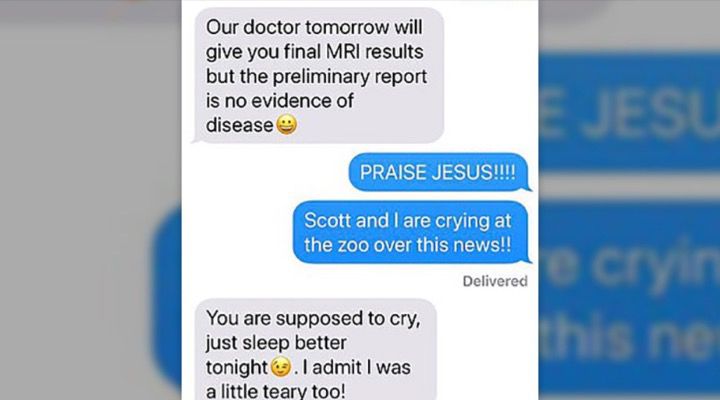
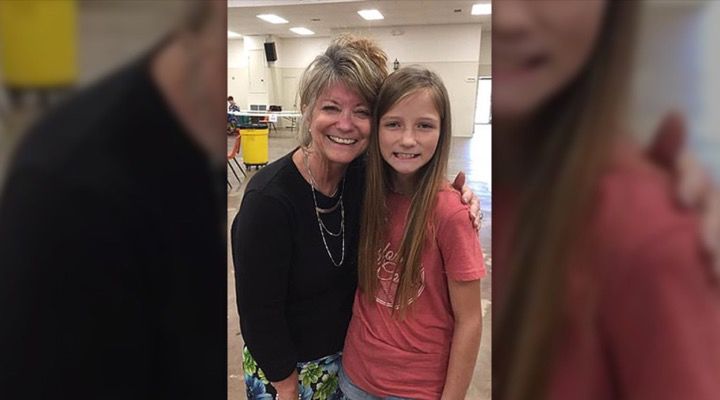
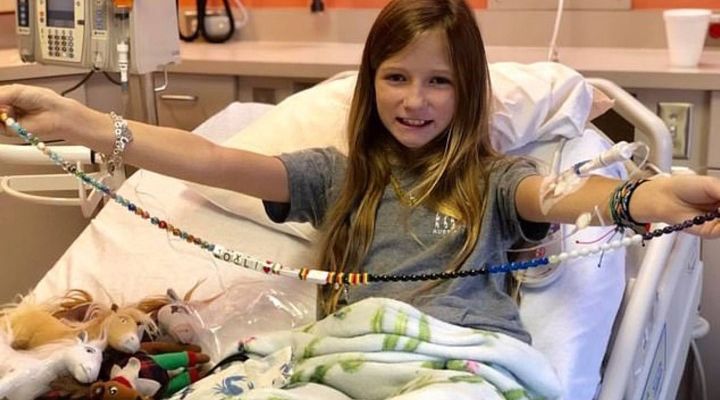




0 commentaires: